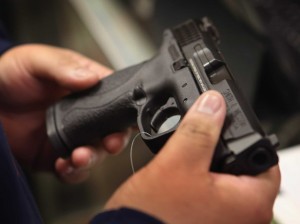Guns, guns, guns. They are being discussed in the news, on our Facebook walls, and in legislative meeting rooms across the country. It’s a touchy topic, and people tend to have opinions that burn red-hot. In the name of some good Southern social decorum, we probably shouldn’t discuss guns, right?
Wrong. While it’s true that gun ownership, the rights of gun owners, gun violence prevention, and gun safety are highly political issues, I say so what?! As parents, we often have to enter into difficult discussions, and this is one of them. We have a duty to ensure the safety of our children, and even if we do not have guns in our own homes, we need to address the topics of guns and gun safety with our kids. We don’t need to voice our political views or start an argument about gun control, but we do need to ensure the well-being of our children and adherence to laws. And that means talking to our kids – and people who care for them – about gun safety.
 Virginia has several laws in place regarding ownership and handling of firearms, and a few directly relate to children and guns. Here’s what you need to know:
Virginia has several laws in place regarding ownership and handling of firearms, and a few directly relate to children and guns. Here’s what you need to know:
1. Virginia’s Child Access Prevention law makes it unlawful to recklessly leave a loaded, unsecured firearm so as to endanger the life or limb of any child under the age of fourteen. Doing so makes you guilty of a crime. And note: A child does not have to be harmed in order to violate this law; the possibility of injury is enough. If a child is actually injured or, tragically, killed, then you may face much bigger legal repercussions. Simply put, lock up firearms out of the reach of any minor, and keep them unloaded.
2. It is illegal to recklessly handle a firearm so as to endanger the life, limb, or property of any person. Breaking this law could land you in jail for up to a year and subject you to fines as well.
3. Firearms are generally prohibited on school grounds. And this law applies to both private and public elementary, middle, and high schools, including buildings and school grounds, even if the grounds are used for a public purpose.
4. You could be liable for an injury that occurs while you are supervising a minor, even if the firearm is not yours. Adults who agree to supervise minor children have a duty to exercise reasonable care during that supervision, and a breach of that duty could land you in a heap of legal troubles. The bottom line is this: Watch kids under your care, and never, ever, allow them access to guns.
On a non-legal, note, gun safety talks with our kids are a must, but giving our kids the tools to deal with dangerous situations isn’t enough. Parents need to prevent those dangerous situations from happening in the first place. Asking the parents of your child’s friends if they own firearms and how and where they store them, can help you determine if you are comfortable with your child being in their care. After all, ensuring our kids’ safety is our most important job as parents.




